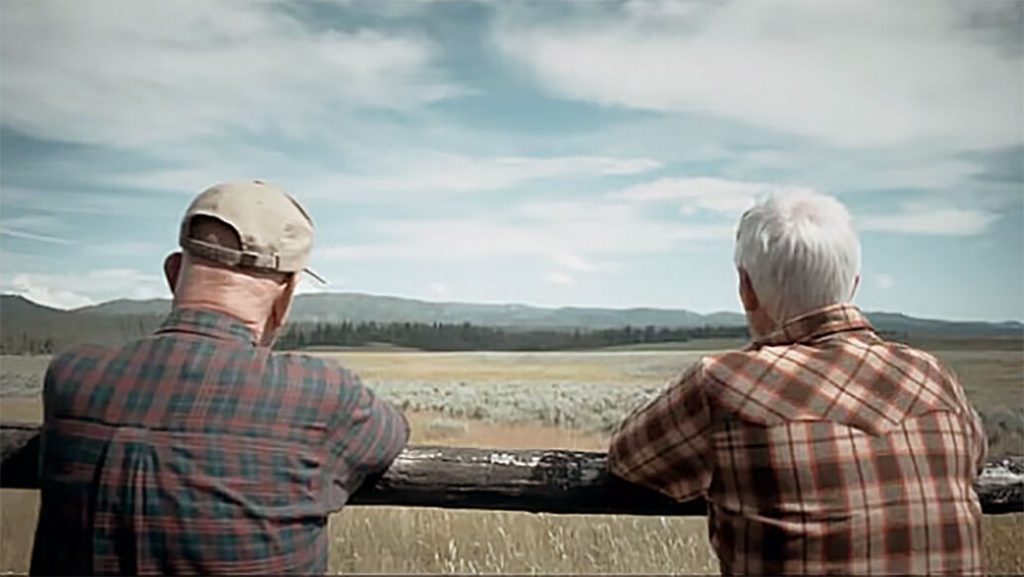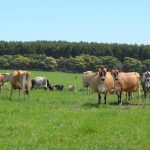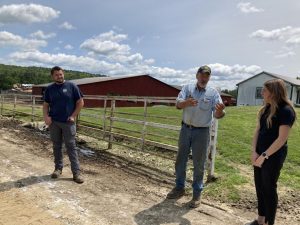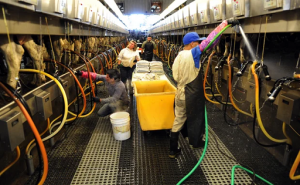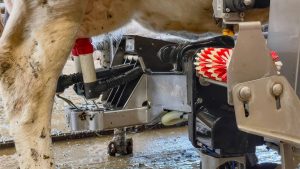
In a bright pink V-neck tee, Jessica Peters stands in her family’s dairy barn, a mixture of natural daylight and fluorescent hues from the lights above her highlighting her face as she records a video for her Instagram following of over 12,000.
“You don’t know me, but I know you. I see you. I feel you. Because I am you,” she said in a video titled, “Dear Struggling Farmer.” In it, Peters explains the challenges farmers face that can make them feel angry and alone.
After dealing with her own mental health challenges, Peters, a dairy farmer in Meadville, Pa., saw a need within the industry to have a conversation about mental health. She said that farmers are hands-on workers, and when they have a problem, they want to fix it themselves.
“When it comes to mental health, that’s a problem. Sometimes, there are issues you can’t fix on your own,” she told Capital Press.
Farmers are among the most likely to die by suicide compared with any other occupation, according to a 2020 study by the federal Centers for Disease Control and Prevention. With COVID-19 fallout, record debts, drought, wildfires and a lack of access to counselors, the need for a conversation about mental health and solutions in rural America is more urgent than ever, experts said.
Uncontrollable factors
Farming is a high-stress occupation, but many of the factors that are vital to the success of a farm are out of the farmer’s control — weather, the pandemic, land values and commodity prices, said Monica McConkey, a Minnesota Rural Mental Health specialist.
In drought areas, the rate of mental health challenges is almost twice as high compared to areas without drought. As the drought leaves most Western states parched, farmers face more stress and anxiety about their farms.
A survey conducted between 1992 and 2010 by co-authors Corinne Peek-Asa and Jeannette Riggenberg found that farmers in the West were more likely to commit suicide than Midwest, South and Northeast.
Rural-urban divide
In a 2021 American Farm Bureau survey, more than half of farmers say they have experienced some mental health challenge. Two in three farmers said the COVID-19 pandemic impacted their mental health.
The CDC says rural areas continuously have higher suicide rates than urban areas and many mental health challenges can be linked to a lack of counselors and other resources in rural areas.
A map showing shortages of mental health professionals compiled by the Rural Health Information Hub highlights many rural areas with shortages of mental health providers.
Understanding agriculture
Mental health experts do not always understand the unique nature of farm stress, said McConkey. This can also be the case for crisis hotlines.
One factor is that most farmers do not have a 9-to-5 workday, making it challenging to schedule time to see an expert. Another factor is that they may feel it is too difficult to explain the complexities of farming.
Farming is often not just a lifestyle but a generational tradition. Peters, the dairy farmer, said that losing a farm often doesn’t always mean just losing an income but a family legacy.
“Therapists may not fully get that a lot of these farmers literally would rather die than lose the farm that has been in their family for 100 to 120 years,” said McConkey.
She said it’s vital to provide an understanding of mental health to everyone associated with agriculture. Crop consultants, agronomists, crop insurance salesmen, seed salesmen and elevator employees should all know the warning signs of someone struggling with mental health issues.
Start a conversation
Even if services are available, some may still be prevented from seeking help due to the stigma.
“There’s still a pretty strong stigma, especially in rural areas, around mental health being considered a weakness, or a flaw in you, versus if you have a heart problem or a kidney problem that’s more acceptable,” McConkey said.
According to a 2019 Farm Bureau poll, nearly 1 in 3 farmers do not feel comfortable talking with others about a mental health condition. Yet 82% of farmers and farmworkers said mental health is an important issue.
“It’s all about them allowing themselves to be vulnerable enough to open up and just talk about it, because everybody’s going through it on some level. They’re not isolated or alone,” said McConkey.
Peters said there is an overlooked step between farmers recognizing their mental health struggles and seeking professional help — speaking with other farmers. Mental health can be an intrusive conversation, but checking in on farmers can save a life.

Resources
“This is Mike Rosmann. What can I do to be of help to you?”
As a farmer and clinical psychologist, Rosmann understands farm stress. From his Iowa home, he aids farmers from across the U.S. daily, offering emotional support and connecting farmers to behavioral health resources.
Rosmann said the number of people seeking help in managing behavioral health issues has remained steady during the past three to four years. But, he said, more men have called rather than their concerned spouse or parent — a common theme beforehand.
“So we actually have seen a reduction in the rate of people ending their own lives through suicide in the agriculture population here in the Midwest for several years,” he said.
In 2018, the Farm and Ranch Stress Assistance Network Act was introduced into the federal Farm Bill. The act sets aside USDA money to help deal with farm stress issues. The people who respond to mental health requests must have an agricultural understanding.
Four regional mental health centers have been funded through the act. Washington State University Suicide Prevention Program is the western contact. The website, https://bit.ly/36KYTNA, features information and a self-assessment.
Jon Iverson, who farms with his family in Woodburn, Ore., chairs the American Farm Bureau’s Young Farmer and Rancher Committee. He said that the American Farm Bureau has developed the “Farm State of Mind,” an online platform at https://www.fb.org/land/fsom. It highlights national resources for people in the agriculture sector looking for assistance. People can locate services by their state and resource types, such as crisis hotline or counseling services.
“There’s resources out there for help or to give farmers the tools that if they see a neighbor or family member that’s not acting right. How to approach the subject, how to bring it up, and then how to help them ask for help or help find help,” Iverson said.
Peters, the dairy farmer, shifts the hand holding her phone and shows the dairy cows poking their heads through the wooden gates behind her.
“Farmers in general are already less than 2 percent of the population. Dairy farmers even less,” she said. “We can’t afford to lose one more.”
